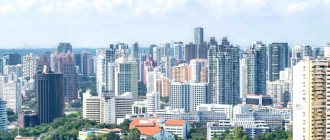Regulatory framework
The main document regulating all emerging legal relations in this area is the Housing Code of the Russian Federation. In addition to this, the Decree of the Russian Federation dated 12.12. 2014 N 1356 contains definitions of the rules and procedures for calculating fees for renting premises on the basis of a social contract.
There are local and regional documents that specify the amounts and procedures for collecting funds in a given region.
Read about how to conclude a social rental agreement for residential premises, as well as the grounds for terminating the agreement, on our website.
Calculation of housing fees
Government Decree No. 1356 dated December 12, 2014 defines a new procedure for indexing the payment for social rent of residential premises under a social tenancy agreement for a housing stock for social use.
Thus, the amount of payment under a social lease agreement for residential premises includes:
- expenses for the acquisition and construction of premises (construction and installation work, acquisition of property rights, rent, acquisition of the right to lease a plot of land, preparation of design documentation, examination, work on the construction of a system of engineering networks, costs of connecting the house to engineering networks, expenses for landscaping and so on);
- expenses for major repairs, for the very maintenance of a social building;
- expenses for equipment of household premises; expenses for equipping living quarters with equipment, furniture, and household items;
- expenses for paying interest on loans;
- expenses related to the payment of taxes, fees and other obligatory payments;
- expenses for reimbursement of state support for the creation and operation of a social housing project.
What does it consist of?
What are the charges?
From the laws regulating the procedure for collecting money for the provision of housing and public services, it follows that it consists of:
- payment for the use of living space . This means directly paying money for the fact that the premises are provided for living;
- money for utilities . This indicator varies greatly depending on exactly how many resources (electricity, water, gas, etc.) the employer spends;
- bills for current repairs.
Typically, the total amount of the fee consists of the listed parts. The amount of payments is not determined randomly or unreasonably.
There is a certain procedure for calculating fees for renting municipal housing and requirements for collecting payments.
Read about the grounds for expulsion, eviction and relocation from municipal housing in our article.
Utilities: composition and payment procedure
In addition to payment for the use of residential premises, payment under social rental agreements also includes payment for the services provided.
The amount of actually consumed services is determined based on the readings of the meter (individual or collective). In its absence, the consumption standard approved by government agencies (electricity and gas supply consumption standards) and local self-government bodies is taken into account.
In Russia, there are two types of service consumption accounting:
- Accounting for supplied housing and communal services according to the collective meter installed at the house. The calculation is carried out in this way: the readings of individual metering devices are subtracted from the general meter readings and the approximate services provided for non-residential premises are subtracted (for example, there are office premises or a store in the building). The result is “scattered” among consumers depending on the square footage of the living space.
- Accounting for services in the absence of a common building meter. In this case, the standard is multiplied by the total area of the building. The result is also distributed depending on the square footage of the living space.
Installed by whom?
The total amount of payment for housing and utilities under a social tenancy agreement is established in accordance with one of the options:
- public authority;
- local government body;
- directly by the lessor, after agreement with the competent authority.
In practice, this means that the initial cost for the provision of real estate is specified in the contract . When concluding an agreement, it is better for the employer to immediately pay attention to the amount of payment.
It can be changed no more than once within 3 years . However, this does not apply to such a general economic phenomenon as indexation . It may affect the total amount of housing payment.
Thus, the landlord has the right to increase the price under a social rental agreement, however, under the conditions specified by law.
Reimbursement for the cost of utilities is made in accordance with the general tariffs established for the use of a particular resource.
Find out on our website whether it is possible to change or rent out an apartment received under a social tenancy agreement.
Social support measures for paying for housing and utilities
(hereinafter referred to as housing and communal services)
are provided to citizens in accordance with the Moscow City Law of November 3, 2004. No. 70 “On measures of social support for certain categories of residents of the city of Moscow”, as well as other legislative and legal acts of the Russian Federation and the city of Moscow.
The procedure for providing citizens with social support measures for paying for housing and communal services was approved by a resolution of the Moscow Government dated December 7, 2004. No. 850-PP “On the procedure and conditions for providing social support measures for citizens to pay for housing and utilities.”
Measures of social support for citizens in paying for housing and communal services are based on the declarative principle and are carried out when citizens provide documents confirming their inclusion in the appropriate preferential category to the organization that calculates payments for these services.
Social support measures for paying for housing and communal services are provided to citizens in the form of a discount on payment when calculating their payments for housing and communal services.
The structure of payments for residential premises and utilities is determined by the Housing Code of the Russian Federation.
Payments for residential premises include payment for the maintenance of residential premises, a contribution for major repairs - for owners of residential premises, as well as payment for the use of residential premises (rental fee) - for citizens occupying residential premises of the state housing stock under a lease agreement.
Payment for the maintenance of residential premises includes fees for services, work on managing an apartment building, for the maintenance and ongoing repairs of common property in an apartment building, for utility resources consumed during the use and maintenance of common property in an apartment building.
The prices for the maintenance of residential premises regulated by the Moscow Government also take into account the costs of handling solid municipal waste.
Utility fees include fees for cold water, hot water, sewerage, electricity, gas and heating.
Preferential discounts on housing and communal services payments are provided to citizens for no more than one apartment (residential premises) based on the rates, prices and tariffs established by the Moscow Government.
Citizens paying for services for the maintenance of residential premises at a price established at a general meeting of owners of premises in an apartment building, preferential discounts are calculated based on this price, but not higher than the price approved by the Moscow Government.
From July 1, 2015, those citizens who use social support measures to pay for the maintenance of residential premises in a private housing stock are provided with the same social support measures to pay contributions for major repairs.
By Decree of the Moscow Government dated December 29, 2014. No. 833-PP for certain categories of citizens who are not entitled to benefits in paying for housing in a private housing stock (disabled people, honorary donors, large families, etc.), additional social support measures have been established for paying contributions for major repairs.
In addition, additional social support measures for paying the contribution for major repairs are established by the Decree of the Moscow Government dated 04/05/2016. No. 161-PP for non-working owners of residential premises who have reached the ages of 70 and 80 years.
In cases where, in accordance with the law, social support measures for paying for living space are provided within the social norm for the area of living space
(the standard for the standard area of residential premises used to calculate the subsidy), preferential discounts are calculated from a total area not exceeding:
• for a citizen living alone – 33 sq.m;
• for a family of 2 people – 42 sq.m;
• for a family of 3 or more people – 18 sq.m. for each family member.
If legal acts establish that social support measures for paying for utility services are provided within the limits of their consumption standards, then when calculating preferential discounts, the standards for the consumption of utility services established by resolutions of the Moscow Government are taken into account:
• dated January 11, 1994 No. 41 – heating, gas;
• dated July 28, 1998 No. 566 – cold and hot water, drainage;
• dated December 20, 1994 No. 1161 – power supply.
In the case when a citizen has the right to social support measures for paying housing and communal services for two or more reasons
, preferential discounts are awarded on one of the grounds at the citizen’s choice. In this case, for each type of payment, different preferential discounts can be applied (for example, discounts for payment for residential premises can be provided on one basis, and for payment of utilities - on another basis; for different utility services, discounts can be provided on different grounds).
If there are several citizens in the family who are entitled to social support measures for paying for housing and communal services
, each of them has the right to take advantage of their own right to preferential discounts or enjoy benefits as a family member of a citizen entitled to social support measures for paying for housing and communal services. In this case, for each unit of service volume consumed (cubic meters, Gcal, etc.), only one preferential discount can be provided.
Family members of a citizen entitled to social support measures for paying for housing and communal services include:
his spouse, parents and children living together with him, unless otherwise specified in the legislative document providing these social support measures. Other persons living together with a citizen entitled to social support measures for paying for housing and communal services can be recognized as members of his family upon presentation of a document confirming their classification as members of the same family (for example, a social tenancy agreement, a court decision, etc.).
If a citizen wishes to take advantage of preferential discounts on housing and communal services payments not at the place of permanent residence
(registration at the place of residence), and at the place of actual residence, he must, in addition to documents confirming the right to social support measures, submit to the organization that calculates payments for housing and communal services, a certificate stating that at the place of permanent residence, payments for housing and communal services are accrued to him without accounting for preferential discounts.
When and to whom to pay?
According to Article 155 contained in the Housing Code of the Russian Federation, payment must be made before the 10th day of each new month that follows the expired one. However, a different procedure may be specified in the contract, in which case the payment is made in accordance with the established schedule.
The payer transfers funds for living in the premises under a social lease agreement directly to the owner of the property. This may be a municipality or a relevant government agency.
Who is exempt from payment? , families recognized as low-income are completely exempt from paying money for the use of a residential property of state and municipal property .
Low-income families are recognized by competent authorities “locally” based on an analysis of the income accruing individually to each family member and other important indicators.
must pay for utilities .
Standards for consumed services
From January 1, 2021, for those citizens who do not have metering devices installed, the standards have increased by an increasing factor. But this applies to consumers who have the technical ability to install meters, but do not install them.
According to the Decree of the Government of the Russian Federation of December 17, 2014 No. 1380, the size of the increasing coefficient is:
- from 01/01/2016 to 06/30/2016 - 1.4;
- from 07/01/2016 to 12/31/2016 - 1.5;
- from 01/01/2017 - 1.6.
Note that according to the indexation of payment amounts, its growth varies depending on the region. Thus, for residents of Moscow, the threshold increase will be 7.5%, for St. Petersburg – 6.5. Whereas for the Novosibirsk region tariffs will increase by no more than 3.5%.
This difference is due to climatic and territorial location, infrastructure development, degree of congestion, type of energy resources, and so on.
Author of the article
Rates
What does it consist of and what does the tariff for the provision of municipal housing depend on? The tariff for the provision of municipal housing is one of the items in the total payment for the use of such housing.
It is unequal throughout the country or even one region. This is determined by the fact that the tariff is determined by certain criteria:
- convenience of the location of the room;
- comfortable conditions;
- livability and quality of housing;
- footprint.
The tariff is set per 1 sq.m. area of the home.
However, the law determines the maximum and minimum of such payment.
In addition to taking into account the characteristics of the living space itself, the fee is lower in the regions than, for example, in Moscow.
Rental housing in the receipt what is it
The full list of services and sub-items of this list can be found in detail in Article 154 of the Housing Code of the Russian Federation. Some changes and additions may be made to the list of services for maintaining common property.
Please note that if a housing organization does not comply with any of the items listed above, you need to find out why this is happening. For example, if cleaning of common areas is carried out by residents, it should not be included in the “housing maintenance” item.
Housing Payment Law
It won’t work to pay for anything at all; they don’t provide citizens with a single apartment for free. Therefore, you will have to pay for the maintenance and current repairs of common property, as stated in Article 678 of the Civil Code of the Russian Federation. It says that tenants must use rented municipal housing only for living, while maintaining it in proper condition . They cannot organize various redevelopments without the consent of the landlord. They are also obliged to pay for the rental of residential premises within the specified time frame. Unless otherwise specified in the contract, they must pay the fee themselves. At the same time, to the question whether the tenant is obliged to pay for major repairs if the apartment is owned, the answer is yes. According to Articles 158 and 169 of the Housing Code, who owns the premises, that is, the tenant, pays for the work. Then the question arises: in the case when the apartment is not privatized, who will pay for major repairs?
Tenants do not make contributions towards capital repairs of public premises, because this is the responsibility of the owners, represented by the municipality or the landlord.
Where is the Moscow rental market heading in 2021?
- district – traditionally cheaper apartments are offered in Zelenograd and New Moscow;
- the location of the house and transport accessibility - everything is the same here as before, the closer to the metro (on foot or by bus), MCC and other transport systems, the more expensive it is;
- the parameters of the apartment itself and its condition - “grandmother’s” renovations traditionally reduce rent.
What does the rental cost depend on?
After the economic recovery, movement began in the rental housing sector - and prices went up again. By January 2021, prices reached the level of January 2020, nationwide. For example, CIAN calculated that on average a one-room apartment in a city with a population of over a million can be rented for 17.1 thousand rubles
, and in “Etazhi” the figure is slightly higher, 17.6 thousand rubles.
The head of the analytical department, Dmitry Taganov, believes that such changes will be first noticed by tenants. He is confident that tax costs, which will additionally fall on the landlord, will be included in the rental price.
This year, the Ministry of Construction plans to submit a bill to the State Duma that is aimed at legalizing the rental housing market. This follows from the government's legislative activity plan. So far, the document is only at the discussion stage, but the direction of work is already clear. In particular, it is proposed to create an information system for recording employment contracts and combine it with the systems of the Federal Tax Service. This will simplify the procedure for calculating and collecting taxes.
Already in 2021, the rental housing market may be brought out of the shadows. How will this turn out for apartment owners who do not pay taxes, and how will it affect prices?
The problem, from the state's point of view, is colossal. The amount of money lost to the treasury is enormous. As Anna Bodrova, senior analyst at IAC Alpari, noted, if the conditions for housing rental are tightened, the amount of income tax can be increased by at least 10%. According to her, now in Russia about 12% of apartments from the total housing stock are rented.
The highest rate is in apartments located on the second and subsequent floors in an apartment building with all amenities, with an elevator and a garbage chute - 29.04 rubles/m2. The lowest price is 14.9 rubles/m2 in apartments located in buildings without one or more types of amenities or with wear and tear of 60% or more, as well as in residential premises declared unfit for habitation. and orders of the Department of Economic Policy and Development of the City of Moscow (DEPiR). At the same time, housing and communal services tariffs will increase twice next year - from January 1, 2021 and from July 1, 2021. Utility tariffs: Utilities Tariff from 01/01/19 Tariff increase from 01/01/19 Tariff from 07/01/19 Growth tariff from 07/01/19. General tariff increase in 2021. Drinking water (cold water supply, Mosvodokanal JSC) 38.70 rub./cub.m 1.70% 40.48 rub./cub. m 4.60% 6.36 %Water disposal (sewerage, JSC Mosvodokanal)27.47 rub./cub.m1.70%29.57 rub./cub.m7.60%9.48%Hot water supply (PJSC MOEK)191.72
Fee for major repairs of a municipal apartment
Contents of the article Relatively recently, the government adopted a law on capital repairs, which did not please property owners. At the same time, the question arises whether the tenant should pay for major repairs if the apartment is not fully owned. Let's look at this issue in this article. It won’t work to pay for anything at all; they don’t provide citizens with a single apartment for free.
Therefore, you will have to pay for the maintenance and current repairs of common property, as stated in Article 678 of the Civil Code of the Russian Federation. It says that tenants must use rented municipal housing only for living, while maintaining it in proper condition.
According to Articles 158 and 169 of the Housing Code, who owns the premises, that is, the tenant, pays for the work. Then the question arises: in the case when the apartment is not privatized, who will pay for major repairs? Tenants do not make contributions towards capital repairs of public premises, because this is the responsibility of the owners, represented by the municipality or the landlord.
Copyright holders pay for major repairs, and when they arrive at the tenants’ address, they must be redirected to the owner of the apartment, at whose expense such work is paid for.







